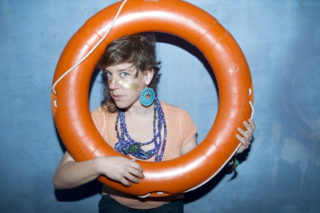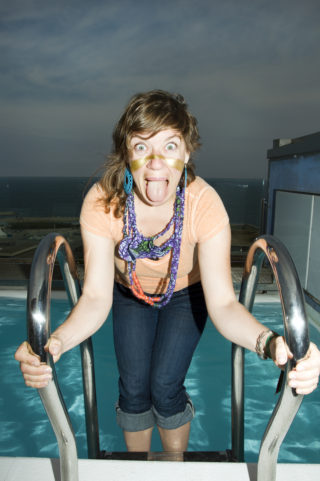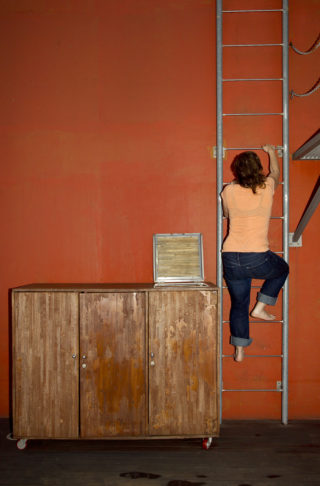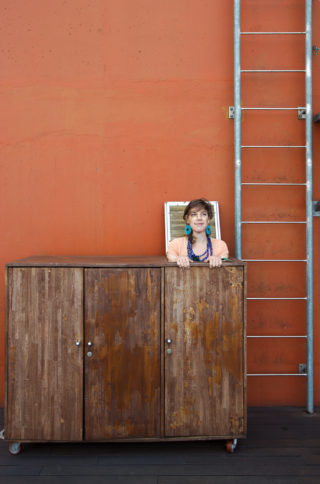Tune-Yards has calmed her nerves via new, violent album ‘W H O K I L L’
Merrill Garbus in discussion at Primavera Sound

Merrill Garbus in discussion at Primavera Sound
Merrill Garbus is brand new to Spain. She’s never been before and since arriving four hours ago she’s spent two hours completing a thirty-minute drive and a further two hours asleep. Jetlag is to blame for one, while the other can be attested to the ongoing fucked-up state of the world, where the angry and disappointed are motivated to take to the streets. Today, following weeks of mass protests and acts of police brutality, the people of Barcelona are marching, and it’s playing havoc with the flow of traffic.
In the lobby of The Hotel Princess – the kind of establishment that’s too pricey to pay for yourself, but not so posh that your trainers blush – it’s as if the thirty-one year old from New England is well rested, even though she isn’t. She runs to the bar to order a couple of bottles of water, but returns with just one. “I couldn’t work out how to order two,” she says. “You can have this one.”
Merrill is extremely easy to talk to, and photograph, it turns out – when she’s asked to stand in the hotel’s rooftop swimming pool she says, “Sure”, not, “Guys, I’ve had two hours sleep!”; when asked to climb a ladder, she does so in order to lower herself into a bin for a better shot. Sonically, at least, her second album, ‘W H O K I L L’, is equally as playful, full of endearingly skewed pop brick-a-brac loops similar to those that made up her 2009 debut, ‘BiRd-BrAiNs’. Beneath the innocent veneer there lurks a world of violence more fitted to song titles like ‘Gangsta’, ‘Killa’ and Riotriot’, though. Blame it on the ongoing fucked-up state of the world, I guess, and Merrill’s relatively new neighbourhood, of which she says: “Oakland is a gritty city, and the energy of it has influenced the record. In fact, I don’t think the album or the recordings would have turned out the same way if I’d moved to anywhere other than there.”
Merrill grew up in Massachusetts before living in Vermont as a puppeteer (“I had a sincere resentment towards puppets for a long time,” she told us of that experience last year), followed by a move to Montreal, where she lived for four years, joined and left a band, and began recording under the purposefully mistyped moniker ‘tUnE-yArDs’. She also spent time living in Africa with her uncle, which is where her love for tribal rhythms comes from. Merrill and her home country have an odd relationship. She’s never totally sure how she feels about the United States of America.
“I’ve just moved back after being out of the country for four years,” she says, “so it’s felt like this really important thing for me to go back and plunge into whatever ugly reality is there right now. I hate to say it, but I can imagine the country going in a direction where I just wouldn’t feel comfortable living there anymore. I wouldn’t want that to happen, but I can see that as a possibility.”
California seems like the best place for her. “It’s its own version of America,” she says. “Much of America doesn’t think it fits with the rest of the country and would like to see it fall off into the ocean. But if you’re in California you realise a sense of the American Dream in many ways. This dream of highways, LA and convertibles. It’s a very different America to the one I grew up in on the east coast, which is older and much more tied to England, actually.”
‘My Country’ – the opening track of ‘W H O K I L L’ – is loaded with swipes at the States, some plain and simple (My country, ’tis of thee/Sweet land of liberty/
How come I cannot see my future within your arms? chirps Merrill at the song’s opening), others more ambiguous, like, The worst things about living a lie is just wondering when they’ll find out. It’s the record’s most memorable lyric, even if we’ve got no idea what or who it refers to.
“That song is definitely a tug of war,” says Merrill. “I haven’t been asked about that line yet though, so thank you for asking. With the lyrics that I write, often I want to keep them open so there can be multiple interpretations. Because I could damn my country and say, ‘The United States is… this… or living a lie, or whatever’, but when I wrote that line it made sense when it happened in my head on a number of levels. That line can apply to a country as much as it can to me or some people in my audience. But that song is funny because it’s a bit spastic with who it’s talking about.”
‘W H O K I L L’ bubbles on, taking in Beck’s white funk on ‘Es-So’, marching hip-hop drums through ‘Gangsta’, reggaeton by ‘Riotriot’ and flurries of toy keyboards come ‘Bizness’. There’s a couple of fleeting synths, but it’s largely a record made from acoustic instruments being frantically crammed together, like Merrill’s ukulele and the saxophones that make up her new brass section. It’s twee and weird and angelic and irregular, finally giving some use to that awful term ‘wonky pop’. It’s music that a toddler would lose it to, providing they don’t listen too carefully to Merrill’s yodelling vocals – Hear a scream, hear a sound in the dark of the night/But right or wrong I’m a new kind of killer (from ‘Killa’) are not for your average Tweenies fan. This is a record that, despite its obscure spacing, does have the word ‘kill’ in there.
“The whole time through it was called ‘Women Who Kill’, in my mind,” says Merrill, gazing at the lobby ceiling. “That’s what fuelled me, and it was a very strong impulse that I had, and then when I told everyone what the album was called, a majority of people would go, ‘Really? Do you have to call it that?’ Because the songs really don’t…. I dunno. I see what people meant – that it felt kind of limiting to call it that, because I am a woman and I think a lot of the songs have to do with being a woman, but certainly you don’t have to be a woman to enjoy them. I hope you agree?” she asks.
“A majority of people that I spoke to about it were people I love and trust, and they said that you’re basically limiting your audience by placing a gender on it. So then I was playing with how to write first of all ‘Women Who Kill’, then ‘Cities Who Kill’ and ‘Who Kill’ was always squashed together, and my friend Alex who did the artwork said, ‘That’s your title, right there.’ What I like about it is that it becomes a nonsense word that still has a little bit of violence in it. It’s confrontation in an abstract way, which is a very tUnE-yArds thing. It’s not an Odd Future thing,” she laughs.
A proud hip-hop fan, Merrill is “extremely curious to see Odd Future tomorrow night. I’ve not heard any of them yet,” she says, “but I’m very curious to see them. It’s just so scandalous!”

Much of my hour spent with Merrill involves recounting an interview she gave us last April. It was a transitional time, full of doubt and unease. On top of her new move to Oakland, the surprise success of ‘BiRd-BrAiNs’ had changed everything, simply because it had gotten record labels involved.
Merrill had originally self-released her debut album, which “was recorded on something like what you’re holding,” she says, pointing at my crumby Dictaphone. Fans were asked to pay whatever they like, as if her homemade record, made largely from clanking household objects together, was some sort of church collection. It netted a thousand dollars and the attention of Portland indie label Marriage Records who then released a limited run of ‘BiRd-BrAiNs’ twelve-inches. It wasn’t until 4AD (the Beggars Group imprint home to the likes of Deerhunter, Bon Iver and The National) re-released the album (twice!) that Merrill started to question how much control she’d have of tUnE-yArDs from now on. Records labels, from my knowledge, don’t really like it when their artists allow fans to choose the price they pay for an album. Merrill agreed, but insisted on not ruling out the pay-what-you-like model when it came to releasing what would become ‘W H O K I L L’, regardless of if she put it our herself, continued working with 4AD or signed a new deal with another label.
tUnE-yArDs did stick with 4AD, who had elevated the project to much greater notoriety through 2010. So? Did she discuss the commerce of her new record with them?
“No,” she says, “and I’ll tell you why. There’s been this need for me to see how they do things. It took us a really long time to sign with the record label again, and throughout the recording of the album I hadn’t signed with anyone, so there was a sense of where is this album going to go. So I felt like I’d made them wait for a very long time for that decision and they’d put a lot into tUnE-yArDs over the past year, so in a way I just wanted to be like, ‘do what you do with this, and show me’, and maybe, once I’ve established myself over the next five years, I can be in a position to discuss that.”
Merrill says she’s “currently choosing her battles”, and if there is one clear difference in how she now feels about tUnE-yArDs, it’s that she’s realised it’s now too big to be controlled by just her. “On a practical level, I don’t have the energy to do everything on my own now.” A self-confessed control freak who spent years as a puppeteer, manipulating marionettes, she doesn’t even say it through gritted teeth.
Glastonbury Festival 2010 was a particularly rude awakening for Merrill. She describes it as “one of the most difficult moments of last year for me,” a “growing pains moment.” With a new band (until then a tUnE-yArDs live show consisted of Merrill sampling sounds live and looping them through pedals, like Feist) but no tour manager, sound man or help, she found Worthy Farm to be a daunting “medieval city of flags,” which is a pretty accurate description of the place.
By the time it came to recording ‘W H O K I L L’, it was clear that the days of recording an album on a twenty dollar Dictaphone were behind the project, so Merrill willingly (kinda) entered a proper studio for the first time, not alone, but with her bassist Nate Brenner and sound engineer Eli Crews. tUnE-yArDs losing its sense of lo-fi fun, musically, was Merrill’s next – and biggest – fear. But the album she came out with, while nowhere near as distorted and trashy as ‘BiRd-BrAiNs’, hardly sounds like a slick studio production. And that, in many ways, is down to the layers of found sounds and field recordings (the sirens of ‘Gangsta’, the percussive use of children’s climbing frames) that Merrill considers sonic tools that connect tUnE-yArDs to the real world of the listener. “I hope the aesthetic is still the same cut-n-paste, patchwork, do-it-yourself vibe [as on the last record],” she says, “but with more space to breathe. I was conscious not to make it sound like a band in a recording studio a long way away.”
For two albums that couldn’t have been made more differently, ‘BiRd-BrAiNs’ and ‘W H O K I L L’ share a definite spirit. Merrill, with a little help, has made the transition from lower than lo-fi to studio recording artist seem effortless.
“Well,” she ponders, “NO, I wouldn’t say it was difficult. Someone said to me, ‘Y’know, you sort of whine a lot in your interviews,’ and it was true, because I found myself saying, ‘it was a really hard process,’ but the truth is, there’s hard and there’s hard – there’s struggling to get fresh water for your family and there’s making a fricking pop album. But it did feel like hard work, like a job, and my job was to stay true to my vision. I had to adjust to the studio, and Eli was very sensitive to me not wanting to hear a lot of reverb or anything. He could tell what my aesthetic was, so in that sense it was easy.”


“It’s interesting, looking back at all of those things we spoke about last year,” says Merrill, shortly before we take the lift to the pool on the twenty-third floor (a trip that will have her approached by fellow Montreal band No Joy, a member of The Fresh & Onlys and a journalist with a video camera requesting an interview). One dread we failed to discuss last year, though, was that of evil, corporate sponsorship. It almost didn’t seem worth it – Merrill’s songs are too weird to sell things. The guys at BlackBerry didn’t seem to think so. They wanted ‘Fiya’ to flog their latest handset, the Torch 9800, and they got it.
It’s safe to say that Merrill didn’t bite their hand off for her song to appear on their TV commercial, though. It was a decision that she wrestled with then, and still does now, to some degree.
“I was spending a lot of time with a musician friend of mine at the time, and I was like, ‘what do I do?’,” she explains, “because with those things you have to decide within a day or less. I mean, for me and my career it wasn’t going to ruin it if I got judged harshly for it, and it was not going to make my career, but for me it was a really hard choice. And my friend just suggested to me that I could give it all away. You can do good with that money. And I’d never thought of that. I thought, oh that’s selfish, selling a song that means so much to a product that I don’t necessarily believe in.”
Merrill did exactly what her friend suggested – she took the money and dished it out. Some to female drum magazine Tom Tom; some to a rock’n’roll camp for girls in her local area; some to Haiti and Japan relief concerts. She also used a chunk to pay fairly the musicians that play with her and on her album, and BlackBerry’s cash also enabled her to pay Eli Crews to engineer ‘W H O K I L L’, because while pressed, marketed and released via 4AD, it was an album self-funded in its production.
“I wouldn’t say I was pleasantly surprised,” continues Merrill, “but I was surprised at the effect that it had on me. It was like me killing this very purist part of myself, and it sort of felt good to be like, ‘okay, I can’t peg myself as that – I’m going to make questionable decisions, and it’s my job to do what I will.’ But I did always intend to give a large chunk of that money to things that I believe in.
“I thought it would be horrible, and that I’d be damned by it, but a great amount of good has come out of it. And my view is that, there is a corporatisation of everything around us, in case we hadn’t all noticed. Even a festival like this is sponsored by corporations, and it wouldn’t happen without them. But I don’t want people to think that I’m saying, ‘It’s all okay now, it’s always ok to sell your songs to ads.’ I don’t mean that or want to have that influence. I don’t think it’s totally fine and I still question it, and I’m still like, ‘I’m selling BlackBerrys, so what do they support? Who inserts the tiny chip and manufactures them?’ I still want to dissect what I’m supporting, but no one can know that that’s your thought process, they just know that you’ve sold out to BlackBerry.”
Perhaps most unfortunately, ‘Fiya’ now carries different meaning for Merrill. When she hears it now, she says “there’s part of me that thinks, I can’t believe I’ve seen this on TV with a narration behind it.” But she’s right when she says that a lot of good has come from it. The death of her fundamentally purist self is a particular triumph, because as the successfully nutty ‘W H O K I L L’ proves, tUnE-yArDs is too hard on herself.